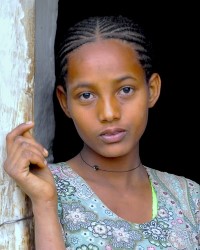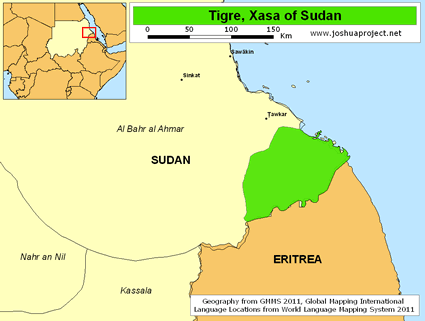The Tigre are traditionally nomadic shepherds who live in Eritrea and northeastern Sudan. They are distinguished from other regional peoples by the fact that they possess hereditary slaves. Historically, most of the Tigre have been scattered between Eritrea's northern highlands and western lowlands. Some moved to Sudan in search of water and grazing lands.
The Tigre are descendants of the ancient Egyptians. Since their language, Tigre, has no script of its own, most literate Tigre write in Arabic. The Tigre in Ethiopia have suffered from a brutal war causing many to need to relocate to Sudan.
The nomadic Tigre raise cattle, goats, sheep and camels. These animals are sold in the markets, and the earnings are used to buy essential items. The nomads do not live in villages but roam about the countryside with their herds. They live in round huts, usually covered with mats made of woven goat or camel hair.
For part of the year the semi-nomadic Tigre live in villages with only two or three huts. Their huts are also round and are covered with mats made of woven goat hair. They also tend livestock, usually cattle and goats.
The settled Tigre farmers raise corn, sorghum, wheat, barley, legumes and linseed. They live in villages, and their homes are usually round with cone-shaped roofs made of branches and leaves. The walls are typically made of palm mats. Most of the farmers raise goats and, occasionally, cattle. They use oxen, mules and donkeys as pack animals. With unpredictable amounts of rainfall and families averaging seven children, many Tigre are dependent on aid for survival.
The Tigre's traditional animal skin clothing has now been almost entirely replaced with commercial clothes. Their diet consists of dairy products, fruit, grain and some slaughtered stock. The men tend the livestock while the women carry water from local water holes, build the huts and care for the children. Tigre women like to wear jewelry, especially silver bracelets and strings of pearls. They also prefer to make their clothing from colored cloth, which is available at trading markets. Tobacco, coffee and beer are frequent indulgences.
Tigre society is patrilineal, which means that the line of descent is traced through the males. Marriages are arranged by the parents; however, wedding customs have varied somewhat since the Tigre converted to Islam. Some now adhere to Islamic customs, while others continue to follow the traditional customs.
Influenced by Muslim Arab missionaries most Tigre converted to Islam during the 1800s. They now profess to be Sunni Muslims, though they also practice folk Islam, which is a blend of Islam and ethnic beliefs. Their traditional beliefs include animal sacrifices and rain making rituals. They offer sacrifices of livestock or corn whenever they think their sins are numerous. They believe that the sacrifice becomes the scapegoat for their sins.
The Tigre also believe in an evil spirit named Zar, who possesses people and causes accidents, illnesses and sometimes death. The people depend on shamans (priests) to cure the sick, communicate with the spirits and control events. The shamans also exorcise demons and perform services by entering into a trance.
Only a few Tigre have accepted Christ. The others are lost in a futile dependence on spirits and the works/righteousness of Islam.
Pray for the Holy Spirit to anoint the gospel as it goes forth via the JESUS Film among the Tigre.
Ask the Lord to raise up strong local churches among the Tigre of Sudan.
Pray for elders and family leaders to have dreams of Jesus, leading them to open their hearts to the only savior.
Scripture Prayers for the Tigre, Eritrean in Sudan.
https://news.un.org/en/story/2021/01/1081422
https://www.aljazeera.com/features/2023/11/2/dashed-hopes-and-limited-aid-trouble-tigrayans-a-year-after-ethiopia-truce
| Profile Source: Joshua Project |












